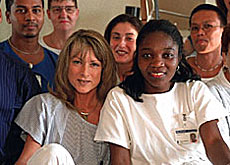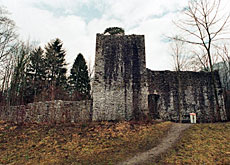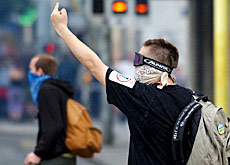Right speaks out against gagging order

A row has broken out over whether Switzerland is moving towards a police state after the Federal Court imposed limits on what can be discussed at closed gatherings.
In a ruling on Monday, the country’s highest court said anti-racism laws could be applied to neo-Nazi meetings.
The decision essentially narrows the legal definition of what constitutes a private meeting.
While some say the ruling should help muzzle extremist groups, the rightwing Swiss People’s Party has criticised the move as an assault on the right to free assembly.
“It is one of the most serious steps ever taken by the Federal Court against the freedom and privacy rights of citizens,” said the People’s Party in a statement.
The ruling concerned a neo-Nazi gathering held in September 1999, which was closed to the public and by invitation only.
Racist behaviour
But the court concluded that anyone could have attended the meeting and witnessed racist behaviour.
Judges said the 40 to 50 people attending were not all known to each other, and therefore the gathering constituted a public meeting and was in violation of anti-racism laws.
Fribourg University law professor Marcel Niggli told swissinfo the ruling clarified a legal grey area, and would give local authorities legal powers to refuse to hire out rooms for racist meetings.
“The aim is solely to reinforce the legal arsenal against racism, hooliganism and propaganda that incites violence,” said Niggli.
“It is not aimed at ordinary citizens making ill-considered remarks to a friend at a party.”
Before the ruling, any event could be considered a public gathering subject to racism laws – even a gathering of close friends and family, he said.
“By defining ‘private,’ this ruling actually restricts authorities.”
Police state
But the rightwing Swiss People’s Party has called for a parliamentary amendment of the anti-racism law and has vowed to open debate on the role of the court.
It said the Federal Court had infringed on free association and interfered in public policy once again.
The party of Justice Minister Christoph Blocher said the ruling “virtually eliminates the private sphere”, and takes the fight against racism well beyond the boundaries set by the 1994 anti-racism law.
“The government promised this law would not be used to suppress freedom of expression, except to counter serious discriminatory statements made in public,” said the People’s Party.
“The court has now said that a private meeting was a public demonstration.”
Explaining its ruling, the court said a discussion would not be considered public or held to break the law, provided listeners and participants knew one another through family, friendship, work or the community.
swissinfo, Elizabeth Meen
Some critics say Swiss law doesn’t go far enough to prevent racism based on sexual preference and nationality.
Swiss anti-racism law resembles that of Austria and Germany, but is less protective of vulnerable groups than similar laws in England and France.
Neo-nazi activities face fewer restrictions in Anglo-Saxon countries which emphasise the right to free speech.

In compliance with the JTI standards
More: SWI swissinfo.ch certified by the Journalism Trust Initiative



You can find an overview of ongoing debates with our journalists here. Please join us!
If you want to start a conversation about a topic raised in this article or want to report factual errors, email us at english@swissinfo.ch.